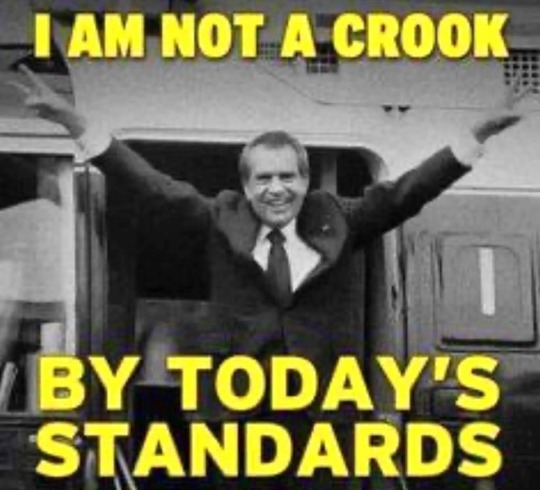#richard m nixon
Text
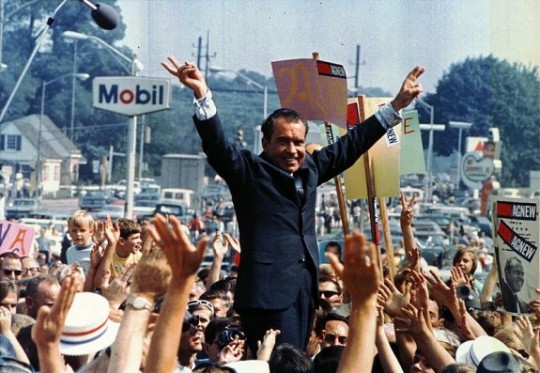
As the 1960s rolled to a close and with the Vietnam War proving itself to be increasingly unpopular amongst the American public, in 1968 President Lyndon B Johnson began secret talks with the North Vietnamese to begin the process of ending the conflict.
Unfortunately for the people of Vietnam and... pretty much everyone directly involved, Richard M Nixon was running on a platform of ending the war as well at the time and the Vietnam War ending too soon under a Democratic president wouldn't do his campaign any good... So naturally, the staff in Nixon's election team were instructed to sabotage the proceedings.
In a telephone conversation with H. R. Haldeman, an aide who would go on to become White House chief of staff, Nixon gave instructions that a friendly intermediary should keep “working on” South Vietnamese leaders to persuade them not to agree to a deal before the election, according to the notes, taken by Mr. Haldeman.
Additionally, it was discovered via the FBI bugging the phone calls between the South Vietnamese ambassador and of Anna Chennault, one of Nixon’s aides, that she had been advised to do the same things ahead of prospective peace talks that were planned to take place in Paris.
Johnson, who habitually recorded his own telephone conversations, is on tape as having been aware of what Nixon and his people were up to, and needless to say he wasn't exactly happy.
In the recently released tapes, we can hear Johnson being told about Nixon’s interference by Defence Secretary Clark Clifford. The FBI had bugged the South Vietnamese ambassadors phone. They had Chennault lobbying the ambassador on tape. Johnson was justifiably furious — he ordered Nixon’s campaign be placed under FBI surveillance. Johnson passed along a note to Nixon that he knew about the move. Nixon played like he had no idea why the South backed out, and offered to travel to Saigon to get them back to the negotiating table.
Despite it being a matter of record that Nixon's presential campaign was trying to prolong the very war he was promising to end, Johnson unfortunately chose not to make said evidence public. Partly because this would mean he'd have to admit to spying on the South Vietnamese ambassador, partly because he thought that his vice president Hubert Humphrey was a lock to win the next election so Nixon wouldn't be a problem anymore, and allegedly because Johnson believed that revealing Nixon's actions would cause the public to loose faith in the government...
Unfortunately, by the time the election finally rolled around, Nixon won the popular vote against Humphrey by just 1%. At that point, despite/due to placing Henry Kissinger in charge of the peace talks to end the war on Nixon's terms, the fighting continued for an additional five years with bombing spreading into neighbouring Laos and Cambodia, resulting in thousands more deaths.
As Robert Evans of the Behind the Bastards podcast put it on their series of episodes about Kissinger, the issue was basically that while Nixon wanted to get out of Vietnam, Vietnam wanted America out of Vietname, and the American public wanted America out of Vietnam, both Nixon and Kissinger didn't want to leave in a manner that made it look like they'd lost. Hence the escalation in fighting and bombing, because they'd gotten themselves stuck in a situation they had no easy solution to escape.
AND YET, it could have gotten worse.
In some tapes released by America's National Archives from 1972, between his complaining about Jews and liberals to Kissinger (yes, he was aware Kissinger was Jewish, yes he called him antisemitic stuff to his face), Nixon brought up a new suggestion...
Nixon is heard discussing an extension of bombing raids over North Vietnam with Henry Kissinger, the national security adviser. Then, rather abruptly, he says: "I'd rather use the nuclear bomb." Whether Nixon was serious or trying to provoke Mr Kissinger is not clear. In his baritone voice, his adviser replies: "That, I think, would just be too much." But Nixon then goes on: "The nuclear bomb. Does that bother you? I just want you to think big."
The Vietnam War eventually came to a close on 30th April 1975, seven years after Nixon sabotaged an attempt to begin ending the war sooner.
16 notes
·
View notes
Text
Wise Words Of Warning ...
Judge Michael Luttig first came to my attention last year when he testified before the January 6th committee. I was impressed with his insight and honesty then … he came across as an intelligent, knowledgeable judge who, while himself a Republican, did not support the shenanigans of the party in the aftermath of the 2020 election. Yesterday, I came across a guest post he wrote for the New York…
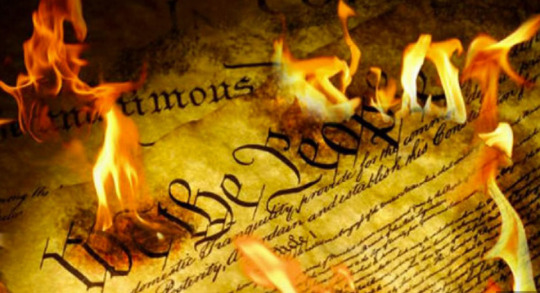
View On WordPress
#country over party#Donald Trump#January 6 committee#Judge Michael Luttig#republican party#Richard M Nixon#Trump indictment#U.S. Constitution
0 notes
Text

40 notes
·
View notes
Text
tally hall probably could've written abbey road but the beatles couldn't've written marvin's marvelous mechanical museum
#the beatles#tally hall#i love both bands this is a joke#weezer#what the hell is weezer doing here#37th US President Richard M. Nixon
82 notes
·
View notes
Text
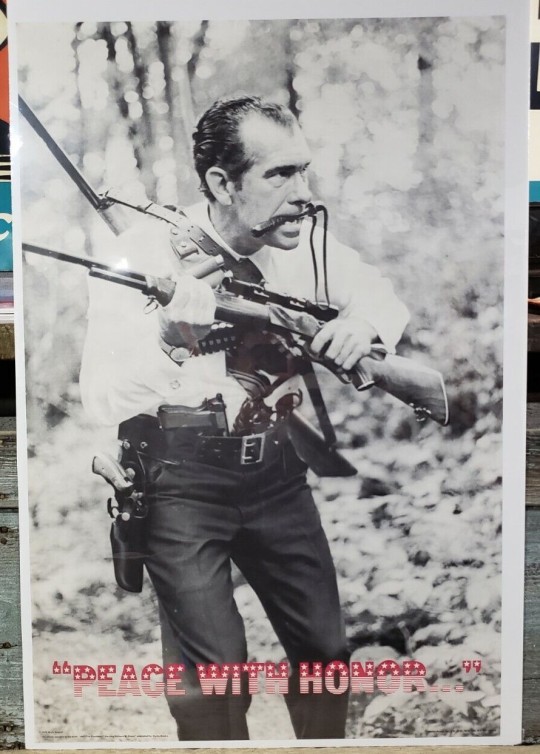
HAPPY B-DAY, "TRICKY DICK" -- WHO SENT 21,000+ U.S. SOLDIERS TO THEIR DEATHS IN HIS FIRST TERM.
PIC INFO: Spotlight on an original 1972 President Richard Nixon "Peace with Honor" parody poster.
"I pledge to you that we shall have an honorable end to the war in Vietnam."
-- RICHARD M. "Tricky Dick" NIXON (January 9, 1913 -- April 22, 1994)
NIXON'S DEATH TOLL: "Nixon’s decision to time military withdrawal from Vietnam to his reelection campaign cost thousands of lives. More than 20,000 American soldiers died during Nixon’s first term. The Vietnamese, Laotian and Cambodian death toll was many times higher. This is by far Nixon’s worst abuse of presidential power."
NIXON/VIETNAM OVERVIEW: "In the 1968 election, Republican Richard Nixon claimed to have a plan to end the war in Vietnam, but, in fact, it took him five years to disengage the United States from Vietnam. Indeed, Richard Nixon presided over as many years of war in Indochina as did Johnson. About a third of the Americans who died in combat were killed during the Nixon presidency. More than 21,200 Americans died in Vietnam and elsewhere in Southeast Asia in Nixon's first term alone.
-- DIGITAL HISTORY, "Nixon and Vietnam"
Sources: www.digitalhistory.uh.edu/disp_textbook.cfm?smtID=2&psid=3464 & eBay.
#Richard M. Nixon#Born On This Day#1972#Richard Nixon#Vietnam War#Nixon Parody#Parody Poster#Poster Art#Vintage Posters#Peace with Honor#70s#Nixon the War Pig#Nixon#Tricky Dick#War Pigs#Anti-war#Anti-Nixon#1970s#American Style#U.S. President#Posters#Propaganda poster#Anti-Richard Nixon#Richard Milhous Nixon#Super Seventies#Poster#Americana#American History#Anti-Vietnam War#Vietnam
5 notes
·
View notes
Text
Republicans co-opting Martin Luther King Jr.’s quotes while pushing policy and supporting legislation directly in opposition to the Civil Rights leader’s wishes is just one example of the party attempting to rewrite history.
In fact, there are so many examples of revisionist history happening these days, particularly among conservatives, that historian and University of Princeton professor Kevin M. Kruse felt the need to publish a book alongside fellow historians, and join this episode of The New Abnormal politics podcast, to set the record straight.
Subscribe to The New Abnormal on Apple Podcasts, Spotify, Google Podcasts, Stitcher, Amazon Music, or Overcast.
He talks about his book Myth America: Historians Take On the Biggest Legends and Lies About Our Past, which is a compilation of historian-written chapters that crush those myths, and shares proof that contrary to Republicans’ denials, the party actively engages in “Southern Strategy,” which is, as New Abnormal co-host Andy Levy explains, the “idea that as the Democratic Party moved away from being the party of slavery and segregation, the GOP sort of consciously moved to fill that void and to become the champion of white Southerners.”
From speaking in coded racial language to antagonizing white voters through fear and taking starkly pro-police stances, they’re absolutely following the knowingly racist playbook of conservatives past, says Kruse.
“This is not some wishful thinking theory that we’ve imposed in the past. The people we’re talking about in documents at the time, in interviews at the time, in books, talk about this,” says Kruse. “[Richard] Nixon talks about this in his memoirs. Harry Dent, his adviser, talks about it in his memoirs. Lee Atwater gives an interview where he talks about the old coded racism of the Nixon-era Southern Strategy. This has long been conventional wisdom. Heads of the Republican National Committee apologized for this. The thought that suddenly people are saying, ‘Oh, this never happened. This is all a myth,’ was just kind of insane and frustrating.”
He also explains Nixon’s role in solidifying this strategy for the GOP and also why we still are taught basic historical lies, including one that Andy is particularly invested in: George Washington never telling a lie.
Also on this episode: TNA co-host Danielle Moodie interviews Jim Freeman, a civil rights lawyer and author of the book, Rich Thanks to Racism: How the Ultra-Wealthy Profit from Racial Injustice, to talk about the Defund the Police movement and the role police unions are playing in stopping it from happening.
#us politics#news#the daily beast#2023#conservatives#republicans#gop#republican national convention#The New Abnormal#podcasts#Kevin M. Kruse#Myth America: Historians Take On the Biggest Legends and Lies About Our Past#southern strategy#the parties switched#president richard nixon#nixon administration#Andy Levy#Harry Dent#Lee Atwater#president george washington#Danielle Moodie#Jim Freeman#Rich Thanks to Racism: How the Ultra-Wealthy Profit from Racial Injustice#defund the police
28 notes
·
View notes
Text
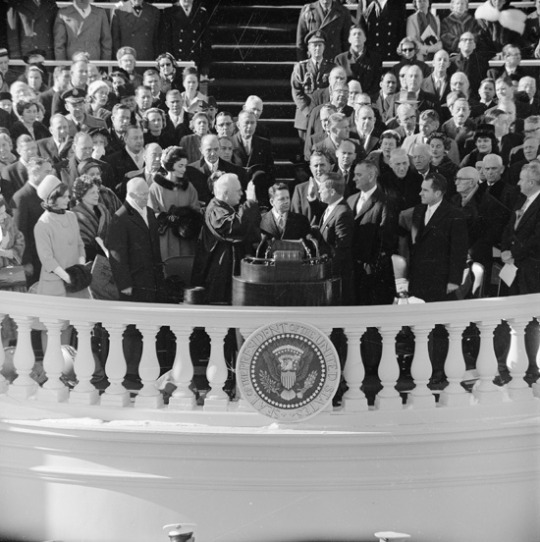


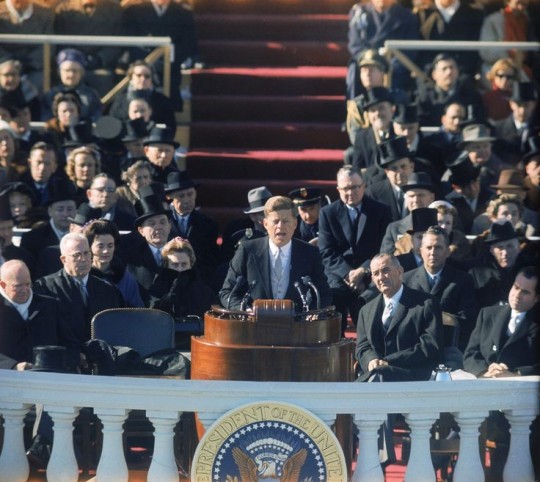


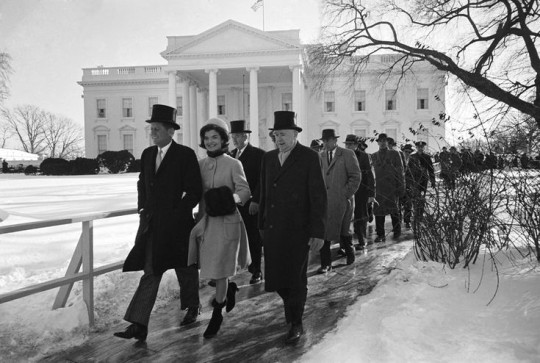

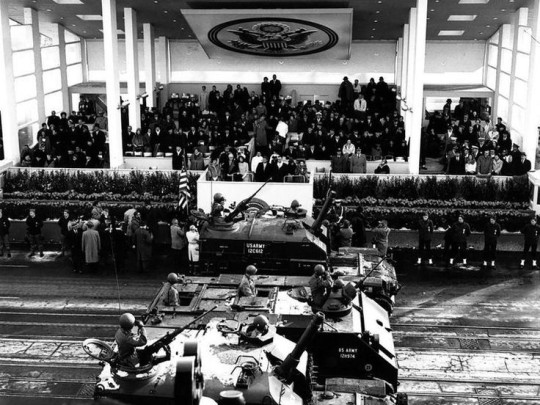
JFK's Inauguration Ceremony, January 20, 1961.
#John F. Kennedy#Jacqueline Kennedy#Rose Kennedy#Eunice Kennedy Shriver#Patricia Kennedy Lawford#Edward M. Kennedy#Lem Billings#Dwight D. Eisenhower#Lyndon B. Johnson#Richard Nixon#Pat Nixon#Mamie Eisenhower#Lady Bird Johnson#JFK's Inauguration
16 notes
·
View notes
Text
Americans Are Still Living in Nixon’s Paranoid Dream
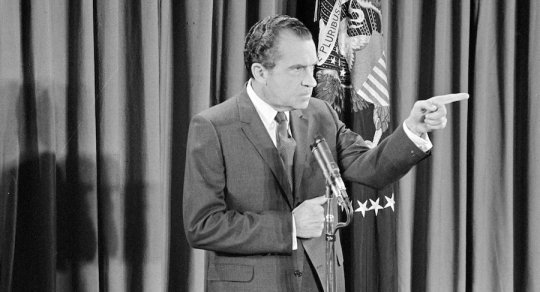
Nothing much seems to have changed in the fifty years since the hysterical beginning of the final act of the Nixon melodrama—the June 17, 1972 break-in of the Democratic National Committee headquarters in Washington DC’s Watergate hotel. And so it’s no coincidence that we’ve attached “gate” to every public scandal since Nixon’s downfall. Rather than a break-in, Watergate offers a glimpse into the Nixonian paranoid style that has infected much of the rest of America over the last half century.
No, nothing much has changed in the fifty years since Watergate. ...fashion, music and taste hasn’t changed much in America over the last fifty years. The one thing that’s changed is the internet and the iPhone. And that’s mostly only compounded American paranoia and isolation from the real world.
......
And, then of course, there’s the classic American way of ignoring history: by denying it exists. The premise of the American self-help industry, of promising a dream-life, is the seduction of a clean slate, of standing outside history, of mastering oneself independently of everything else.
This is now a post-gendered dream-life, I’m afraid, that is being sold equally to women as men. But the self-help industry—for men and women as well as whites and blacks and browns—feeds on Nixonian paranoia. It may sell books and speeches, but it only imprisons us more deeply in history.
read full article here-
. https://lithub.com/we-are-still-living-in-nixons-paranoid-america-and-its-killing-us/
‘‘Do you remember, your President Nixon? (ooh)
Do you remember, the bills you have to pay?
Or even yesterday?’’
Oh boy. beam me up Scotty.
10 notes
·
View notes
Text
The ugliest presidential portrait in the National Portrait Gallery is Bill Clinton's, and it's not even close.
#the best one somehow belongs to Richard M. Nixon#washington dc#trump's portrait is trying to be intimidating but just comes off as sad clown#obama's still looks like that one simpsons meme of homer disappearing into a bush#reagan's is kind of smudgy and blurry for some reason?
1 note
·
View note
Text
Elmer Fudd has been called a mediocre man; but this is unwarranted flattery. He is a nimrod of monumental littleness.
Bugs Bunny
0 notes
Text
Coupgate? Trumpgate?
Coupgate? Trumpgate?
This week will begin the televised hearings of the January 6th committee and while I’m not holding my breath, I am hopeful that the American public will at least be convinced of one thing: Donald Trump is a crook, a criminal, who attempted a coup to overturn the U.S. election in 2020 and can NEVER be allowed to hold public office again. Robert Reich gives us a comparison to another set of…
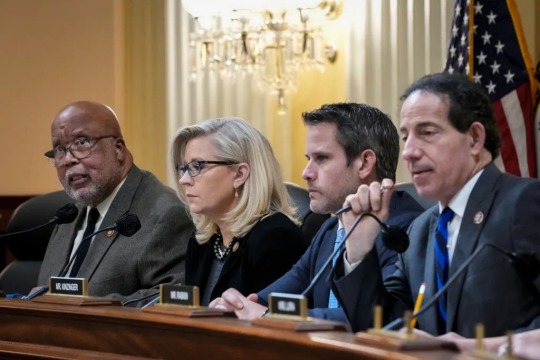
View On WordPress
#Howard Baker#January 6th attempted coup#January 6th commission#Liz Cheney#Richard M Nixon#Robert Reich#the former guy#Watergate hearings
0 notes
Text
Watch "Presidents Who Were Traitors - You Won’t Believe Number Three" on YouTube
youtube
History you probably wasn't taught
#republican hypocrisy#republican lies#republicans#republican#1960s#1968#1968 election#richard m. nixon#richard nixon#president nixon#nixon#Youtube#ronald reagan#reagan#george w bush#w#bush#donald john trump#trump#donald trump
0 notes
Text
US-Funding in Post-War Japan
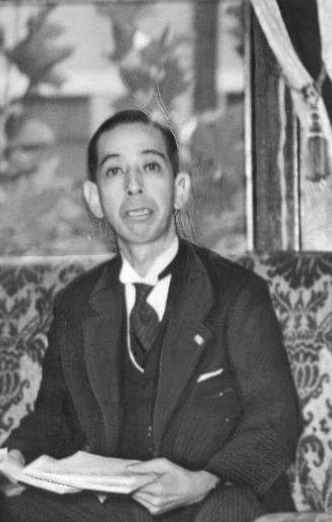
Excerpted from "Kishi and Corruption: An Anatomy of the 1955 System" by Richard J. Samuels (Japan Policy Research Institute - Working Paper No. 83, December 2001)
Using American Money
Kishi brilliantly exploited American paranoia about communism during the Cold War. The historian Michael Schaller reports that Ambassador Douglas MacArthur II convinced Secretary of State John Foster Dulles that the United States had to support Kishi or risk losing the alliance. Kishi returned triumphant from his June 1957 visit to Washington with promises that the security treaty would be revised and, possibly, with promises of secret funding from the Central Intelligence Agency. There have been rumors for decades about a secret "M-Fund" that was constructed out of surplus military materiel that came under allied control at the war's end in 1945. These stockpiles allegedly included rare metals and diamonds, proceeds from the sale of which were used by General Marquat, chief of SCAP's Economic and Science Section (hence "M"-Fund) as a sort of Japan-specific secret Marshall Plan to stimulate the postwar Japanese economy. The Fund was probably also used to underwrite the sudden (and unbudgeted) formation of the National Police Reserve at the start of the Korean War and to buy conservative political support for the alliance with the United States.According to journalists, M-Fund disbursements went to two channels. One was to mainstream conservatives led by Yoshida Shigeru. A separate channel was purportedly opened to Kishi Nobusuke to help sustain the anti-mainstream group. Both were allegedly managed jointly with U.S. officials. Former U.S. Assistant Attorney General Norbert Schlei alleges that Vice President Nixon turned over exclusive control of the M-Fund to Kishi (presumably during their 1957 Washington meeting) and that this was when things changed: "Beginning with Prime Minister Kishi, the Fund has been treated as a private preserve of the individuals into whose control it has fallen. Those individuals have felt able to appropriate huge sums from the Fund for their own personal and political purposes. . . . The litany of abuses begins with Kishi who, after obtaining control of the fund from (then Vice President Richard) Nixon, helped himself to a fortune of one trillion yen. . . . Kakuei Tanaka, who dominated the Fund for longer than any other individual, took from it personally some ten trillion yen. . . . Others who are said to have obtained personal fortunes from the Fund include Mrs. Eisaku Sato . . . and Masaharu Gotoda, a Nakasone ally and former chief cabinet secretary."All, some, or none of this may be true, but we know for certain that Kishi and his brother Sato Eisaku frequently approached Ambassador MacArthur to play the anti-communist card in the hope of securing financial support. According to Kishi's own account, he frequently used the good offices of his friend, Harry Kern, a former Newsweek Bureau Chief, to make arrangements for him at the U.S. embassy in Tokyo. Declassified U.S. State Department records note efforts by Sato, then Kishi's Finance Minister, to seek U.S. funds "to combat extremist forces." In July 1958, Sato met secretly with one S. S. Carpenter, the First Secretary of the U.S. Embassy. According to Carpenter's declassified memorandum of a conversation on July 25, 1958, Sato explained that a "secret organization (of) top business and financial leaders" had been established by the LDP and that this group had "contributed heavily" to the recent electoral campaign. Sato explained that they would shortly have to return to these business leaders for an expensive upper house campaign and felt that the LDP and the zaikai could not "combat communism" alone. If there was already an M-Fund to cover these requests, Carpenter did not let on. He told Sato that the Ambassador "had always tried to help Mr. Kishi and the Conservatives in every way possible,"but he declined to authorize the funds Sato was seeking. In short, it is plausible but not yet demonstrable that Kishi Nobusuke played a central role in establishing a financial relationship between conservative Japanese politicians and the government of the United States.
#m-fund#japanese politics#liberal democratic party#history#united states#united states of america#usa#Douglas MacArthur#nobusuke kishi#imperialism#ldp#politics#japan#kishi family#kishi#eisaku sato#masaharu gotoda#nixon#richard nixon#anti-communism
0 notes
Text

THE BOMB AS "BLOODY DAGGER" GIVES THE PIECE AN ESPECIALLY BRUTAL TOUCH.
PIC INFO: Spotlight on an anti-Richard Nixon Vietnam War-era propaganda poster that translates as "Nixon the Murderer," c. 1972.
OVERVIEW: "In the 1968 election, Republican Richard Nixon claimed to have a plan to end the war in Vietnam, but, in fact, it took him five years to disengage the United States from Vietnam.
Nixon provided the South Vietnamese army with new training and improved weapons and tried to frighten the North Vietnamese to the peace table by demonstrating his willingness to bomb urban areas and mine harbors. He also hoped to orchestrate Soviet and Chinese pressure on North Vietnam.
The most controversial aspect of his strategy was an effort to cut the Ho Chi Minh supply trail by secretly bombing North Vietnamese sanctuaries in Cambodia and invading that country and Laos. The U.S. and South Vietnamese incursion into Cambodia in April 1970 helped destabilize the country, provoking a bloody civil war and bringing to power the murderous Khmer Rouge."
-- VIETNAM PROPAGANDA (Vietnamese Propaganda Art Poster Shop from Hanoi, Vietnam)
Source: www.vietnampropaganda.com/product/nixon-the-assassin.
#Richard Nixon#Nixon the Murderer#Nixon#Anti-Nixon#Anti-Richard Nixon#Vietnam War#Vietnam#Vietnamese#Vietnamese Propaganda Posters#Posters#Poster#Propaganda Posters#Poster Art#Super Seventies#1972#Anti-war#1970s#70s#Richard M. Nixon#Vintage Posters#Nixon the Assassin#Propaganda poster#Richard Milhous Nixon#Americana#American History#Anti-Vietnam War#Military Industrial Complex#Tricky Dick#American Style#Illustration
4 notes
·
View notes
Text
Do #Donald and #Hillary Have Dogs?
Hardly anyone will disagree with the assertion that this presidential election is one of the most heart wrenching, mind boggling, soul sickening, of all time. Both candidates of the two major parties have unfavorable ratings higher than any other presidential candidate in the modern era. And perhaps worst of all, both candidates of the two major parties have a difficult time with truth.
I am not…
View On WordPress
0 notes
